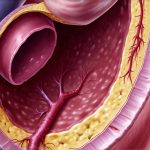Gastrointestinal cancers, encompassing those affecting the stomach and esophagus, represent a significant global health concern. Early detection is paramount for improved treatment outcomes, yet these cancers often present with vague symptoms that can easily be attributed to less serious conditions. This makes recognizing potential warning signs – and prompting timely medical evaluation – critically important. Understanding the nuances of symptom presentation, risk factors, and how these cancers develop allows individuals to become proactive about their health and seek appropriate care when necessary. It is vital to remember that experiencing any of the symptoms discussed does not automatically indicate cancer; it simply highlights the importance of consulting a healthcare professional for accurate diagnosis and assessment.
The challenge in early detection stems partly from the insidious nature of these cancers. In many cases, particularly with esophageal cancer, symptoms may not become noticeable until the disease has progressed to a more advanced stage. Stomach cancer can also mimic common digestive issues like indigestion or heartburn, leading to delays in seeking medical attention. Furthermore, awareness about these specific cancers remains relatively low among the general population, hindering proactive screening and early intervention efforts. This article will delve into the identifying symptoms of both stomach and esophageal cancers, emphasizing the importance of recognizing subtle changes and seeking prompt medical evaluation for any persistent or concerning issues.
Recognizing Symptoms of Esophageal Cancer
Esophageal cancer develops in the lining of the esophagus – the tube connecting your throat to your stomach. There are two main types: adenocarcinoma (more common in the Western world, often linked to acid reflux) and squamous cell carcinoma (more prevalent globally, associated with smoking and alcohol). Initial symptoms can be easily overlooked because they closely resemble other more benign conditions. A key early sign is dysphagia, or difficulty swallowing, which progressively worsens as the tumor grows and narrows the esophageal passage. This isn’t just about food getting stuck occasionally; it’s a consistent struggle to swallow even soft foods or liquids.
The progression of dysphagia often dictates how patients present to their doctors. Initially, individuals might notice difficulty with solid foods, then progress to needing softer textures, and eventually struggling with liquids. Other common symptoms include unintentional weight loss – a significant red flag in any cancer – chest pain (which can be mistaken for heartburn), and chronic cough. The persistent cough isn’t relieved by typical over-the-counter remedies. Regurgitation of food or fluids is also frequently reported, again often dismissed as simple reflux at first.
It’s important to differentiate between occasional difficulty swallowing due to a large meal or temporary esophageal spasm, and the consistent, progressive dysphagia characteristic of esophageal cancer. If you find yourself consistently altering your diet to accommodate swallowing difficulties, or experiencing unexplained weight loss alongside these issues, seeking medical attention is crucial. Remember that early diagnosis dramatically improves treatment options and outcomes.
Symptoms Associated with Stomach Cancer
Stomach cancer, also known as gastric cancer, often goes undetected in its early stages because it frequently causes vague symptoms. Like esophageal cancer, many initial signs can be attributed to more common digestive problems. Early-stage stomach cancer may present little to no noticeable symptoms. As the disease progresses and the tumor grows, symptoms become more apparent and concerning. One of the most common – and often overlooked – indicators is persistent indigestion or heartburn that doesn’t respond to typical treatments like antacids. This isn’t a fleeting episode; it’s a continuous, bothersome discomfort.
Other significant symptoms include unexplained weight loss, loss of appetite, feeling full after only small amounts of food (early satiety), and nausea. Vomiting – sometimes with blood – can also occur, particularly as the cancer advances. A key difference between stomach cancer symptoms and simple indigestion is their persistence and lack of response to conventional treatments. Additionally, individuals might experience abdominal bloating, fatigue, or a general feeling of discomfort in the upper abdomen. In some cases, patients may notice black, tarry stools due to bleeding in the stomach lining – this requires immediate medical attention.
It’s vital to understand that these symptoms are not exclusive to stomach cancer; they can be caused by numerous other conditions. However, if you experience a combination of these symptoms persistently and they don’t improve with standard treatments, it is essential to consult your doctor for evaluation. Early detection through endoscopy and biopsy remains the most effective way to diagnose stomach cancer at a treatable stage.
Understanding Risk Factors & Screening Options
Identifying risk factors can help individuals understand their potential susceptibility to these cancers and discuss appropriate screening strategies with their healthcare providers. For esophageal cancer, major risk factors include: – Smoking – significantly increases both types of esophageal cancer – Excessive alcohol consumption – particularly combined with smoking – Chronic acid reflux (GERD) – increasing the risk of adenocarcinoma – Obesity – linked to increased GERD and subsequent cancer risk – Family history of esophageal cancer. Stomach cancer risk factors include: – Helicobacter pylori infection – a common bacterial infection that can lead to chronic gastritis and eventually cancer – Smoking – Diet high in salted, smoked foods – particularly prevalent in some cultures – Family history of stomach cancer – Previous gastric surgery – Atrophic gastritis (chronic inflammation of the stomach lining).
Screening for esophageal cancer is generally recommended for individuals with Barrett’s esophagus (a precancerous condition caused by chronic acid reflux) and those with long-standing GERD symptoms. Endoscopy, where a thin flexible tube with a camera is inserted into the esophagus, allows for visualization and biopsy of any suspicious areas. Screening for stomach cancer isn’t routinely recommended for the general population due to its lower incidence in many Western countries. However, individuals with a strong family history or H. pylori infection may benefit from endoscopic screening. The specific screening recommendations should be discussed with your doctor based on individual risk factors and medical history.
Differentiating Symptoms From Other Conditions
The overlap between symptoms of stomach and esophageal cancers and other more common conditions can create confusion and lead to delays in diagnosis. It’s critical to understand these distinctions and when further investigation is warranted. For example, difficulty swallowing can be caused by benign conditions like esophageal strictures (narrowing) or achalasia (a rare disorder affecting the esophagus). Indigestion and heartburn are incredibly common and often related to dietary factors or stress. However, persistent indigestion that doesn’t respond to typical treatments should raise concerns.
Similarly, abdominal pain can stem from a wide range of issues, including irritable bowel syndrome (IBS), gastritis, or ulcers. Unexplained weight loss can occur due to various medical conditions and psychological factors. The key differentiator lies in the persistence of symptoms, their lack of response to standard treatments, and any accompanying “alarm” signs such as blood in the stool or vomit. A healthcare professional will evaluate your specific symptoms, medical history, and perform appropriate diagnostic tests – like endoscopy, biopsy, imaging scans (CT or MRI), and blood tests – to determine the underlying cause.
When to Seek Immediate Medical Attention
While this article aims to inform about potential cancer symptoms, it’s crucial to emphasize that self-diagnosis is never recommended. However, certain signs warrant immediate medical attention: – Significant and rapid weight loss without intentional dieting – Persistent vomiting, especially if blood is present – Black, tarry stools (melena) indicating bleeding in the digestive tract – Severe abdominal pain – particularly if accompanied by fever or bloating – Difficulty swallowing that progressively worsens and interferes with eating or drinking. These symptoms could indicate a serious underlying condition requiring prompt diagnosis and treatment. Don’t hesitate to seek medical help if you experience any of these alarming signs, even if you initially attribute them to less serious causes. Early detection is the most powerful tool in fighting both stomach and esophageal cancers.


















